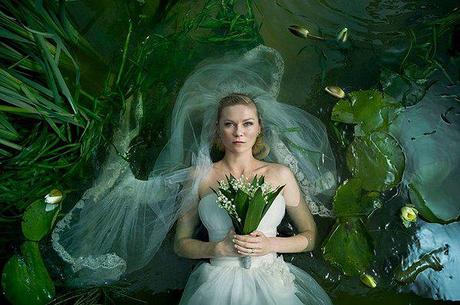The destruction of the world never seemed so elegantly breathtaking. It’s not unfair to the viewers and readers to say that this film is about the end of the world. I am not spoiling anything since the destruction of the Earth happens in the first 5 minutes of the film set to some of the most gorgeous cinematography that von Trier has ever done. Imagery that is both haunting and serene at that same time, sets the ultimate mood for a film that chronicles the the lives of a family learning to deal with this oncoming celestial body. Lars von Trier promised to deliver a film with no happy endings and I guess destroying the world is the only way to give us a truly sad ending.

I remember my excitement for this film, one that went unseen by a lot of people, but then again Lars von Trier isn’t the happy-go-lucky director that everyone gets excited about. His films are a trial of patience, tolerating his directing while he truly beats his characters into submission with a series of maladies. Not something that is uplifting by any means, but he does get deeper into the human psyche more than most directors, often with a gorgeous visual style. Melancholia was an ambitious film, as the focal point of the film is the destruction of Earth in a cataclysmic fashion that Roland Emmerich would be jealous of. The film uses the Earth ending event as a means to tell the story of two sisters, both learning to cope with the crushing depression of the impending doom. It’s a fascinating study on acceptance and anguish. What we experience when the knowledge of extinction is imminent. The two sisters share in the experience, one who accepts the fate ahead, the other clinging to the last vestige of humanity.
Melancholia is a rough film to watch. The notion of watching the final moments of existence can really sour the mode of a moviegoer, but the aim of the film is to have us connect and come to accept what is happening to the characters. Setting up the film with the destruction of the world already prepares us for the end, so that allows us to focus and connect with the characters on screen. Charlotte Gainsbourg and Kirsten Dunst are amazing in this film. Both turn in compelling performances and embrace the end they are given. It’s a dour film, since everyone dies, but the development of the characters and reflection on their shortening lives makes this a far more emotional powerful film.
The film is currently available on Netflix Instant, so there should be no excuse to see this film. I will say that if the world were to end, I at least hope we go out in the same classical music filled spectacle that Melancholia delivers in the opening of the film.
Below is a link and excerpt to my original review.
Lars von Trier has made an apocalyptic film, seem almost too personal. The world is ending, but the only thing the story focuses on are Justine and Claire. It really brings home this depression theme even closer when you realize that the story isn’t really about the world as a whole, just the world that the two sisters belong to. They are all they have left in the world and it’s that last bit of humanity that makes the swift death they experience, just a bit more melancholy. Read more here

